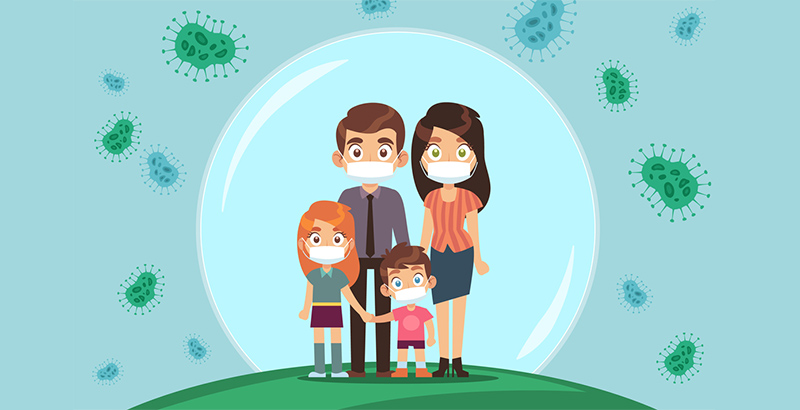As Adults Move Toward Herd Immunity, Could an Unexpected COVID Side Effect Be Kids Unable to Fight Off Germs Long-Term?

As we approach the grim milestone of one year since the COVID-19 pandemic first hit the U.S., academic research and news reporting have documented the many troubling adverse effects of school closures and lockdowns for children, from malnutrition, to severe learning loss, and mental health difficulties.
But with vaccines rolling out and the pandemic’s end seemingly in sight, albeit with continued worries for new variants, some immunologists are voicing concern for another unforeseen side effect: that all that time spent in quarantine, indoor isolation and sanitized surroundings may inadvertently be weakening kids’ immune development.
“Normally, children are exposed to lots of viruses, particularly respiratory viruses,” explained Dr. Donna Farber, an immunology professor at Columbia University. “And that’s important for establishing protective immunity for pathogens.”
Since the pandemic hit, however, non-COVID respiratory infections have plummeted, likely due to masking and social distancing measures. Cases of respiratory syncytial virus (RSV), for example, which normally causes 58,000 hospitalizations for children under 5 each year, have become almost non-existent, said Farber. One Texas hospital saw 600 instances of RSV in November 2019, but reported not a single case in November 2020.

While reduced illness may sound like good news, the numbers have Farber worried, especially for young kids.
Getting sick, she said, is actually an important step toward children growing up into healthy teenagers and adults. Immune development depends on the body turning cells called “naive t-cells” into “memory t-cells” that can respond quickly to known pathogens. After the body’s first exposure, “everything’s revved up” to stave off illness in the future, said the Columbia immunologist.
Children in lockdown, especially those whose schools have remained remote, may be largely sheltered from new microbes, which leaves Farber concerned for their immune development.
“Childhood is a time when you want to build … an immunity to particular pathogens that are everywhere,” she said. “If you don’t have that exposure, what’s going to happen to your immunity? Are you going to have built it up?”
She bases her fears on a concept known as the “hygiene hypothesis.” If young children avoid early exposure to everyday microbes, the theory holds, their immune systems may not mature properly and can overreact to certain germs or environmental triggers. Children who are kept in very clean environments, research indicates, have higher rates of conditions like hay fever and asthma. This phenomenon, many experts believe, explains the uptick in allergies to items such as eggs, peanuts, and soy in the developed world.
As hand sanitizer and disinfectant wipes fly off the shelves in grocery stores, Dr. Eline Luning Prak, professor of pathology at the University of Pennsylvania, echoes Farber’s concern for kids’ health in sterile, isolated COVID-19 environments.
“[Q]uarantine could have adverse effects on the development of the immune system in children who are not exposed to the usual viruses,” she told The 74 over email.

The fear is not unanimous, however. Dr. Nilu Goonetilleke, an associate professor of immunology at the University of North Carolina and a mother herself, thinks it’s unrealistic to imagine that most children have been kept in a completely sterile lockdown world.
“If the kids are going into the park, especially when they’re young and they’re still putting all their toys in their mouth … they’re still getting exposed to a lot of things,” she said.
“Frankly, I am enjoying a year without snot-covered children,” she added. “I assure you, the snot will be back.”
The gradual return to post-pandemic normalcy may cause kids to pick up common colds, says Goonetilleke, and after lockdown, those colds may be a little more severe than usual. But children will recover and be fine in the long-term.
“Our immune system is always developing. It’s built to deal with this,” she said. “I think [kids] will be okay.”
But Luning Prak is not as confident that they will bounce back so easily.
“The longer children remain in ‘hyper-hygienic’ conditions associated with quarantine,” she said, “the more chance there is for the effects to be long-lasting.”
Even amid fears of weakened immune development, however, parents shouldn’t tear off their kids’ masks and let them lick handrails, Farber says. Without vaccines for children, the risk of infection remains potent. Youth under 15 have been shown to catch and transmit COVID-19 at about half the rate of adults, possibly thanks to nimble immune systems that respond more quickly to the virus and quell infection. But some young people with no underlying conditions have experienced unexplained long-term symptoms after getting infected, and a concerning new variant emerging in Italy and France has spread much more quickly through children than other versions.
In the meantime, if parents do want to adjust their routines to encourage healthier immune development for their kids, they can take their children for walks outdoors and arrange playdates with friends, says Farber. In addition, some health experts say that Americans are over-cleaning in response to COVID-19 — a primarily airborne virus — and the Columbia professor agrees that most parents can also probably cut back on disinfecting surfaces.
“You don’t need to sanitize everything for the children,” she said.
But amid all the “do’s” and “don’ts,” the best way to ensure kids stay healthy will be to take every measure possible to reduce COVID-19 spread and help life return to normal.
“It’s really we just need to get rid of the pandemic,” said Farber.
Help fund stories like this. Donate now!

;)
